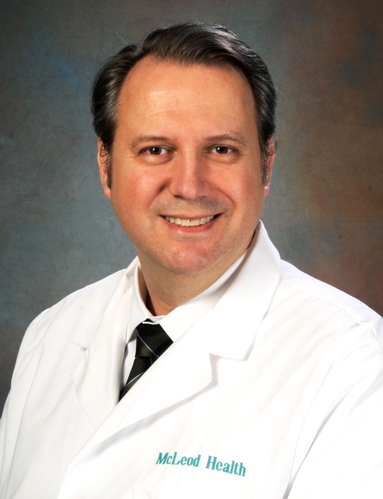Circulatory Advice

Dr. Gabor Winkler
McLeod Vascular Surgeon
McLeod Vascular Associates
The human body contains 60,000 miles of blood vessels. This massive mileage, along with the heart and other muscles, is the circulatory system. When circulation is poor, it slows or blocks the blood flow, preventing all the cells in the body from receiving the oxygen and nutrients they need. If this happens for an extended period, it could lead to limb loss.
Signs of Poor Circulation
Patients who frequently notice cold or numb hands or feet could have an issue with circulation. The most common symptoms of poor circulation include tingling, numbness, throbbing or stinging pain in the limbs, and muscle cramps. Those who are fair-skinned might get a blue tinge to their legs. Poor circulation can also dry your skin, turn nails brittle, and make hair fall out, especially on the feet and legs. Diabetics with poor circulation often have wounds and sores that are slow in healing.
Improving Circulation
For those with poor circulation, or who simply want to keep their circulation healthy, there are things that can be done to help keep the blood flowing.
The most important – if you smoke, quit. Nicotine harms the walls of the arteries and thickens the blood so much it can’t get through. Talk to your primary care physician if you need help with quitting.
Maintain your blood pressure. A blood pressure that is too high causes a condition that hardens the arteries and chokes off blood flow. Aim for 120 over 80 or less, but talk to your primary care physician about the best numbers for your age and health.
Stay hydrated. Blood is about half water and it is important to remain hydrated to keep your blood moving. Make a goal of eight glasses a day but increase that number if exercising or when it is hot outside.
Sitting for long periods of time is bad for circulation. It weakens leg muscles and slows blood flow in the legs which can cause a blood clot. Getting on your feet periodically works the valves in the leg veins, sending the blood up to the heart. If on a long road trip, make sure you stop to take breaks for everyone to get out and stretch their legs for a minute.
Aerobic exercise means “with oxygen.” Run, bike, walk, swim – take in more oxygen and move your muscles. Set a goal to exercise thirty minutes, five to seven days a week. Break exercise time into smaller chunks if it is easier to fit into your schedule.
Pressure compression stockings help the blood vessels work better. They put a small amount of pressure on the legs so the blood doesn’t hang around too long. Instead, it will move back up to the heart. Compression stockings will keep the legs from getting tired and achy, ease swelling in the feet and ankles as well as help prevent and treat spider and varicose veins.
Eat plenty of fruits and vegetables and watch out for too much salt. Stay clear of saturated fats found in red meat, chicken, cheese and other animal sources. This will help keep your weight in a healthy range, ensure cholesterol and blood pressure stay in check and your arteries clear.
The Outlook
Anyone experiencing uncomfortable symptoms should discuss them with their primary care physician. Untreated conditions can lead to serious complications. Your physician will work to determine the cause of your poor circulation, treat the underlying issue, and if necessary refer you to a vascular surgeon.
When caught early, diseases that lead to poor circulation are treatable. Left untreated, poor circulation may indicate a disease is in a progressive state. Life-threatening complications, such as loose blood clots, can also occur if the condition is not properly treated.
Dr. Gabor A. Winkler is a board certified vascular surgeon with additional advanced interventional fellowship training. Dr. Winkler cares for patients with McLeod Vascular Associates in Florence and at the office of McLeod Cardiology Associates, located at 540 Physicians Lane, Sumter. For information on scheduling appointments, call (843) 777-7043.
-
McLEOD REGIONAL MEDICAL CENTER FLORENCE
843-777-2000 -
McLEOD DARLINGTON
843-777-1100 -
McLEOD DILLON
843-774-4111 -
McLEOD LORIS
843-716-7000 -
McLEOD SEACOAST
843-390-8100 -
McLEOD CHERAW
843-537-7881 -
McLEOD CLARENDON
803-433-3000



-
McLEOD REGIONAL MEDICAL CENTER FLORENCE
843-777-2000 -
McLEOD DARLINGTON
843-777-1100 -
McLEOD DILLON
843-774-4111 -
McLEOD LORIS
843-716-7000 -
McLEOD SEACOAST
843-390-8100 -
McLEOD CHERAW
843-537-7881 -
McLEOD CLARENDON
803-433-3000
 Find a Doctor
Find a Doctor  Locations
Locations  Services
Services